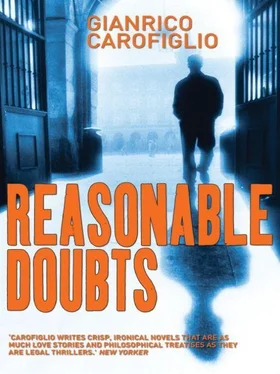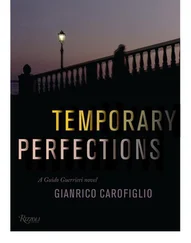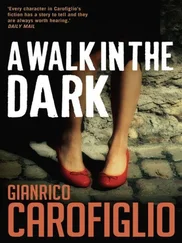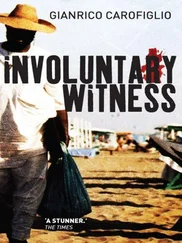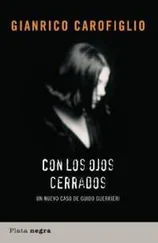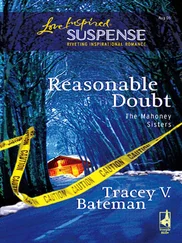Gianrico Carofiglio - Reasonable Doubts
Здесь есть возможность читать онлайн «Gianrico Carofiglio - Reasonable Doubts» весь текст электронной книги совершенно бесплатно (целиком полную версию без сокращений). В некоторых случаях можно слушать аудио, скачать через торрент в формате fb2 и присутствует краткое содержание. Жанр: Криминальный детектив, на английском языке. Описание произведения, (предисловие) а так же отзывы посетителей доступны на портале библиотеки ЛибКат.
- Название:Reasonable Doubts
- Автор:
- Жанр:
- Год:неизвестен
- ISBN:нет данных
- Рейтинг книги:5 / 5. Голосов: 1
-
Избранное:Добавить в избранное
- Отзывы:
-
Ваша оценка:
- 100
- 1
- 2
- 3
- 4
- 5
Reasonable Doubts: краткое содержание, описание и аннотация
Предлагаем к чтению аннотацию, описание, краткое содержание или предисловие (зависит от того, что написал сам автор книги «Reasonable Doubts»). Если вы не нашли необходимую информацию о книге — напишите в комментариях, мы постараемся отыскать её.
Reasonable Doubts — читать онлайн бесплатно полную книгу (весь текст) целиком
Ниже представлен текст книги, разбитый по страницам. Система сохранения места последней прочитанной страницы, позволяет с удобством читать онлайн бесплатно книгу «Reasonable Doubts», без необходимости каждый раз заново искать на чём Вы остановились. Поставьте закладку, и сможете в любой момент перейти на страницу, на которой закончили чтение.
Интервал:
Закладка:
There are always people in the Osteria del Caffellatte. Not many, it’s true, but there are people there all the time. Obviously, there are some strange characters among them, but most are normal people. Who must be the strangest of all, if they’re out buying books at four o’clock in the morning.
There are three small tables and a small bar counter, if you want to drink something or eat a slice of one of the cakes Ottavio makes in the afternoon before he opens. Early in the morning you can have breakfast with the same cakes and a caffe latte. If you’re in the shop when it closes, he offers you any left-over cake, says see you tomorrow, closes the shop, and then stands in front of the entrance and smokes his only cigarette of the day. Then he goes for a walk around the awakening city, and just as other people are starting work he returns home and goes to sleep, which is something he can only do by day.
Inside the bookshop, there were three girls sharing a joke. Every now and again they looked in my direction and laughed louder. So, I thought. My trajectory is over. I’m a ridiculous man. Or more likely, I’m just terminally paranoid.
Ottavio was sitting at one of the little tables in the tiny bar area, reading. When he saw me come in, he waved and then went back to his reading. I started walking around between the counters and the shelves.
I picked up a copy of Musil’s The Man without Qualities, leafed through it, read a few pages, and put it back. I’ve been doing that for some years. Forever, in fact. With Musil, and above all with Joyce’s Ulysses.
Every time, I’m confronted with my own ignorance and I tell myself I ought to read these books. But I never even get as far as buying them.
I don’t suppose I’ll ever know first-hand the adventures – if that’s the right word – of Stephen Dedalus, Leopold Bloom or Ulrich. I’ve resigned myself to that, but whenever I’m in a bookshop, I still leaf through those volumes, as a kind of ritual of imperfection. My own.
After a little more wandering, I was attracted by a beautiful cover with a very beautiful title. Nights in the Gardens of Brooklyn. I’d never heard of the author – Harvey Swados – or the publisher – Bookever. I read a few lines of the introduction by Grace Paley, was won over, and decided I’d get it.
A young policeman came in. He went up to Ottavio and asked him something. There was a police car double-parked outside.
I spotted a book called Nothing Happens by Chance. I decided it referred to my case – whatever my case was – and I’d get that one, too. The policeman went out with a book in a small bag. It’s a kind of bag you only find in Ottavio’s shop. On one side there’s a drawing of a steaming cup of caffe latte, a blue cup without handles, and the name of the shop. On the other side, printed on the plastic, a page of a novel, a poem, a quotation from a sage. Things that Ottavio likes and wants to pass on to his nocturnal customers.
I already felt much better. For me, bookshops are a tranquillizer and an antidepressant. The girls had left without my noticing. Now Ottavio and I were alone. I went up to him.
“Hi, Guido. How’s it going?”
“Fine. What did the policeman buy?”
“You wouldn’t believe me if I told you.”
“Try me.”
“ Uninterrupted Poetry.”
I was surprised. “Paul Eluard?”
“Yes. You must be one of the three or four lawyers in the world who know that book. And he must be the only policeman.”
“He won’t get far.”
“I agree. What are you getting?”
I showed him the books I’d chosen and he approved. Especially the Swados.
“And what are you reading?”
He was holding a small book with a cream-coloured cover, from another publisher I didn’t know: Botanical Editions.
He handed it to me. The title was The Manumission of Words. There was a subtitle, Notes for a Seminar on Writing. No author’s name on the cover.
I leafed through it and read a few paragraphs.
Our words are often devoid of meaning. This happens because we have worn them out, exhausted them, emptied them through excessive and above all unwitting use. We have turned them into empty shells. In order to tell stories, we must regenerate our words. We must give them back their meaning, texture, colour, sound, smell. And to do this we have to break them into pieces and then rebuild them.
In our seminars we give this process of breaking and rebuilding the name “manumission”. The word manumission has two meanings, apparently very different. The first meaning is synonymous with tampering, violating, causing damage. The second, which derives directly from ancient Roman law (manumission was the ceremony at which a slave became a free man), is synonymous with liberation, redemption, emancipation.
The manumission of words encompasses both these meanings. We take words to pieces (we manumit them, in the sense of tampering with them, violating them) and then we put them back together (we manumit them, in the sense of liberating them from the bonds of verbal conventions and meaningless phrases).
Only after manumission can we use our words to tell stories.
“Is this your only copy?”
“Yes, but you can have it, if you like. Why are you interested in it?”
Yes, why was I interested in it?
I have an old wish that I recently expressed, and a friend has assured me it’ll come true. The wish is to become a writer, and seeing this book I thought I’d do a bit of studying. Just to make things easier for the department responsible for magic lamps, four-leaf clovers and falling stars.
I fantasized a little about these paragraphs and about other things. Without replying to Ottavio’s question. He respected my silence, and didn’t speak until he was sure I’d come back down to earth.
“You’re not crazy about your work, are you?”
I gave a kind of sneer. It was true, I wasn’t crazy about my work.
“And if you could change professions, what would you do?”
This is getting to be an epidemic. Everyone’s asking me about my wishes. Come on, out with it, you’ve been ganging up on me behind my back.
“I’d like to be a writer. I like books more than anything else. I like reading them and I’d like to write them, if I can. Of course, I don’t really know if I can, seeing as I’ve never had the courage to try.”
Ottavio simply nodded and said nothing. I like people who don’t make stupid comments. And sometimes the best way not to make stupid comments is not to say anything at all.
“How about a drink?”
“Sure.”
“Rum?”
“Rum would be fine.”
He took a bottle from the bar counter and poured two doubles. We drank and chatted for a while about a whole lot of things. From time to time people came in. Some bought books, some just browsed.
A man of about fifty, in a jacket, tie and coat, slipped into his trousers a copy of The Trilogy of the City of K., buttoned up his coat and headed for the exit. Ottavio noticed, asked me to excuse him for a moment, and caught up with the man at the door.
He said he would like to be able to give books away. But unfortunately he couldn’t. He was obliged to make people pay for them. He said this without a hint of sarcasm. The man stammered a few words, something to the effect that he really didn’t know what he, Ottavio, was talking about. Patiently, like someone who’s said the same thing many times, Ottavio told him there were two options. Either the man paid for the book and took it away – he could even have a discount – or else he could put it back on the shelf, go home to bed as if nothing had happened, and come back whenever he liked. The man said all right then, he’d buy it. And in an extraordinary, surreal sequence he went to the cash desk, pulled the book out of his pants, paid – getting the discount – took his nice little bag, bade everyone goodnight, and left.
Читать дальшеИнтервал:
Закладка:
Похожие книги на «Reasonable Doubts»
Представляем Вашему вниманию похожие книги на «Reasonable Doubts» списком для выбора. Мы отобрали схожую по названию и смыслу литературу в надежде предоставить читателям больше вариантов отыскать новые, интересные, ещё непрочитанные произведения.
Обсуждение, отзывы о книге «Reasonable Doubts» и просто собственные мнения читателей. Оставьте ваши комментарии, напишите, что Вы думаете о произведении, его смысле или главных героях. Укажите что конкретно понравилось, а что нет, и почему Вы так считаете.
